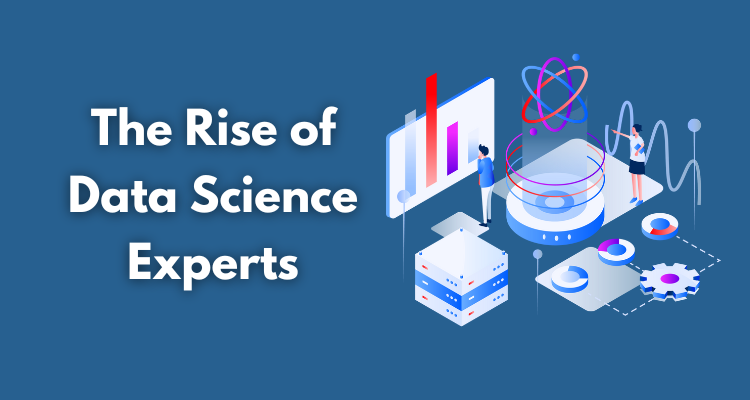Every company in the world today collects and uses data to inform their decisions and remain competitive in the market. Data science experts are important in enabling these companies as they help analyze data, find patterns, and evaluate various strategies. As industries become more dependent on technology, the demand for skilled professionals in this field continues to grow.
Companies are using data to improve efficiency, increase profits, and better understand customer needs. But what makes data science so essential? How do these experts shape modern business practices?
Understanding their impact helps explain why companies need to embrace data-driven approaches to be successful in an ever-changing business environment.
Table of Contents
ToggleThe Growing Demand for Data Science Experts
Data science roles have experienced explosive growth in the past decade. According to the U.S. Bureau of Labor Statistics, jobs in data science are projected to grow by 36% between 2021 and 2031, significantly outpacing the average job growth rate.
This surge is fueled by the widespread adoption of digital technologies, the rapid increase in big data, and the necessity for businesses to make smarter, data-driven decisions. As a result, organizations across various industries are competing to hire top talent in data science to enhance their operations and gain a strategic advantage.
Why Are Companies Investing in Data Science?
- Competitive Advantage: Companies that effectively leverage data outperform their competitors by making informed decisions and optimizing strategies.
- Revenue Growth: Businesses using AI and advanced analytics have reported up to 30% revenue increases due to improved customer insights and personalized marketing.
- Cost Savings: Data-driven decision-making minimizes waste, optimizes supply chains, and enhances overall efficiency.
- Regulatory Compliance: Many industries, including finance and healthcare, rely on data science to comply with strict regulations and ensure data security.
Key Industries Hiring Data Scientists:
| Industry | Demand Growth (%) | Example Companies |
| Finance | 40% | JPMorgan, Goldman Sachs |
| Healthcare | 35% | Pfizer, UnitedHealth Group |
| E-commerce | 50% | Amazon, Shopify |
| Manufacturing | 30% | Tesla, Siemens |
| Marketing | 45% | Google, HubSpot |
How Data Science is Transforming Business Operations
1. Data-Driven Decision Making
Companies now rely on data-driven insights rather than intuition. Advanced analytics, AI, and machine learning help executives make informed decisions, minimizing risks and maximizing profitability.
Example: Netflix uses predictive analytics to recommend content based on user preferences, reducing churn and increasing viewer engagement.
2. Personalization & Customer Experience Enhancement
Data science enables hyper-personalization, where companies customize their services based on user behavior, preferences, and past interactions.
Example: Amazon’s recommendation engine contributes to 35% of its total revenue, by suggesting relevant products based on customer data.
3. Operational Efficiency & Cost Reduction
Data science optimizes logistics, supply chain management, and fraud detection, leading to significant cost savings.
Example: FedEx leverages AI-powered route optimization, reducing fuel costs and delivery time.
4. Fraud Detection & Cybersecurity
With cyber threats on the rise, businesses use data science to detect fraudulent activities and prevent security breaches.
Example: Banks employ machine learning algorithms to analyze transactions in real-time, identifying anomalies that indicate fraud.
5. Human Resources & Talent Acquisition
Companies use data analytics to improve hiring processes, identify skill gaps, and enhance employee retention.
Example: LinkedIn’s AI-driven hiring solutions help businesses find the best candidates through data analysis.
The Role of AI & Machine Learning in Data Science
AI and machine learning are transforming data science by enabling businesses to process massive datasets, automate decision-making, and generate actionable insights. These technologies help companies optimize operations, enhance customer experiences, and innovate in ways that were previously impossible.
- Predictive Analytics: Businesses use historical data to forecast sales, customer behavior, and market trends. For example, financial institutions monitor curated stock lists to predict stock market movements to improve investment strategies.
- Natural Language Processing (NLP): AI-powered chatbots and virtual assistants improve customer service by understanding and responding to human language. Companies like Google and Apple leverage NLP for voice recognition in their products.
- Computer Vision: Industries such as healthcare and security use AI based on annotated data for ML to analyze images and videos, enabling facial recognition, medical image analysis, and autonomous vehicle navigation.
- Deep Learning: Neural networks process unstructured data, such as social media posts, medical scans, and surveillance footage, helping companies uncover hidden patterns.
- Reinforcement Learning: AI models continuously learn and improve decision-making through simulations, benefiting industries like robotics and gaming.
Stat Alert: 80% of enterprise executives believe AI-driven analytics will be crucial for their business growth by 2025.
Challenges Faced by Businesses in Adopting Data Science
While data science presents immense opportunities, integrating it into business operations comes with challenges that organizations must overcome:
- Talent Shortage: The demand for skilled data scientists far outweighs the supply, making data and ML engineers hiring and retaining top talent difficult. Businesses must invest in training and upskilling employees to bridge the gap. Some companies are partnering with universities and online education platforms to develop talent pipelines.
- Data Privacy & Security: Strict regulations such as GDPR and CCPA require businesses to protect customer data. Non-compliance can result in hefty fines and reputational damage. Companies must implement robust security measures, including encryption and access control. By being transparent about data use and collection practices, you can uphold compliance standards and keep users safe. Solutions like server side tagging help limit the exposure of user data, offering a privacy-forward approach to tracking and analytics.
- Data Silos: Many organizations struggle to consolidate data from multiple sources. Without a unified system, data remains fragmented, making it challenging to derive meaningful insights. Businesses that integrate cloud-based data solutions see improved collaboration and efficiency.
- High Implementation Costs: Adopting AI and machine learning requires significant investment in infrastructure, software, and skilled professionals. Small and mid-sized companies often face budget constraints, leading some to explore outsourcing or managed data services.
- Ethical Considerations: AI bias and responsible AI usage are critical concerns. Poorly trained AI models can lead to discrimination in hiring, lending, and law enforcement decisions. Companies must ensure transparency in AI algorithms and implement fairness audits.
The Future of Data Science in Business
As businesses continue to embrace digital transformation, data science will play an increasingly crucial role in shaping strategies and driving innovation across industries. Growing technologies such as quantum computing, edge AI, and blockchain are poised to revolutionize how businesses leverage data, enhancing both efficiency and security. These advancements will enable businesses to make more informed decisions, automate complex processes, and gain deeper insights into consumer behavior.
In the near future, industries such as healthcare, finance, retail, and manufacturing will see significant transformations. In healthcare, AI-powered data science will enable personalized treatment plans and predictive diagnostics, improving patient outcomes. In finance, machine learning algorithms will optimize risk assessments and fraud detection, providing faster, more accurate services. Retailers will use advanced analytics to predict customer preferences and optimize supply chains, enhancing customer experience and operational efficiency. Manufacturing companies will adopt predictive maintenance models, reducing downtime and improving production efficiency.
Key Predictions:
- By 2030, AI and data science are expected to contribute $15.7 trillion to the global economy, underscoring the immense value these technologies bring to business operations.
- Around 90% of Fortune 500 companies will have dedicated AI-driven data science teams, showcasing the increasing demand for specialized expertise.
- Automated AI models will handle more tasks traditionally performed by humans, reducing the need for manual data processing and enabling businesses to focus on more strategic, value-added activities.
Looking ahead, we can expect a continued rise in the use of data-driven decision-making, with businesses increasingly relying on AI and machine learning to optimize operations, enhance customer engagement, and create competitive advantages. The convergence of AI, IoT, and blockchain will further drive innovation, making data science an integral part of the future business landscape.
Conclusion
The rise of data science experts is revolutionizing how businesses operate, offering unparalleled insights, automation, and strategic advantages. Companies investing in data-driven methodologies are outpacing their competitors, reducing inefficiencies, and enhancing customer experiences. As AI and machine learning continue to grow, the role of data scientists will only become more critical in shaping the future of business. Companies that fail to embrace this transformation risk being left behind in an increasingly data-driven world.
FAQs
1. What qualifications are needed to become a data scientist?
Most data scientists hold degrees in computer science, statistics, or engineering, along with expertise in Python, R, SQL, and machine learning.
2. How do businesses use data science in marketing?
Companies analyze customer behavior, segment audiences, and optimize ad campaigns to improve conversion rates and ROI.
3. What industries benefit the most from data science?
Finance, healthcare, e-commerce, manufacturing, and marketing sectors see the highest impact from data-driven insights.
4. What tools do data scientists use?
Popular tools include Python, TensorFlow, Hadoop, Tableau, and Jupyter Notebooks.
5. Will AI replace data scientists?
AI will automate some tasks, but human expertise in strategy, ethics, and complex problem-solving will remain irreplaceable.









